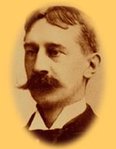Grinnell, George Bird
 George Bird Grinnell. (Source: PBS)
George Bird Grinnell. (Source: PBS) George Bird Grinnell (1849-1938), American anthropologist, scientist, conservationist, publisher, writer and explorer who helped to: establish the first Audubon Society; preserve and establish Yellowstone as a national park area, keeping it free from private development; establish Glacier National Park; and establish the Boone and Crockett Club.
George Bird Grinnell was born in Brooklyn, New York. As a young man, Grinnell lived in Audubon Park which had previously been the estate of John James Audubon. He attended the school conducted by Madame Audubon who no doubt encouraged Grinnell's interest in the natural world. Grinnell graduated Yale College in 1870 and earned his Ph.D. at Yale in 1880. He accompanied the first expedition of Professor Othniel C. Marsh whose research first revealed the wealth of Tertiary fossils entombed in the deposits of Nebraska, Kansas, Wyoming and Utah.
After becoming assistant in osteology of the Peabody Museum at Yale College, Grinnell spent summers accompanying several other important scientific expeditions in the western part of the country. He was the naturalist in General Custer's expedition to the Black Hills in 1874 as well as in Col. William Ludlow's expedition to Yellowstone National Park in 1875. On these early expeditions to the west, Grinnell often lived with Indian tribes who regarded him as their friend. He became an advocate on their behalf in the East and was instrumental in having dishonest Indian agents removed and more humane policies adopted. In the 1890s, in recognition of his friendship, White Calf, chief of the Blackfeet, chose Grinnell as head chief. President Grover Cleveland made him commissioner in charge of dealing with the Blackfoot and Belknap Indians in 1895, and later President Theodore Roosevelt asked him to mediate a better land controversy with the Sioux at the Standing Rock Reservation.
In 1876 Grinnell became editor of Field and Stream magazine and senior editor and publisher in 1880. He remained with the magazine until 1911 while continuing his efforts to influence progressive legislation regarding conservation and environmental issues. He campaigned intensely against market hunting and for realistic game laws and was influential in the enactment of the Migratory Bird Treaty in Great Britain in 1916 as well as the adoption of strong regulatory control of hunting in all states.
Field and Stream's investigation of game poaching in Yellowstone National Park led Congress to pass the Yellowstone Park Protection Act of 1894 which was the cornerstone of the national park legislation. Grinnell originated the idea of a glacier national park on the basis of a map he had made in 1885. The magazine's articles regarding his explorations of the area now known as Glacier National Park in Montana were influential in its inclusion in the National Park System initiated in 1910.
Emanating from each of his many publications and speeches, Grinnell altered the manner with which many Americans viewed the natural world. One of his first battles began in the late 1800s when he called for the formation of a society to fight the use of feathers, particularly in women’s fashion. Hats decorated with feathers, bird parts, and even entire stuffed birds, were a mainstay of the upper class woman in France, Britain and England. Eight to ten warblers were used on a single hat. Additionally, the long plumes of egrets or even the taxidermied heads of owls defined the well-dressed. Style reached broader audiences through advertisements in the magazines, including Godey’s Lady’s Book and Harper’s Bazaar. In 1886, Grinnell wrote: "Very slowly the public are awakening to see that the fashion of wearing the feathers and skins of birds is abominable. There is, we think, no doubt that when the facts about this fashion are known, it will be frowned down and will cease to exist. Legislation of itself can do little against the barbarous practice, but if public sentiment can be aroused against it, it will die a speedy death…." Grinnell did just that.
In order to bring attention to the problem of "feather fashion," Grinnell founded the Audubon Society of New York in 1886. This group became the forerunner of the National Audubon Society. He also served as president of the National Parks Association and as trustee of the American Museum of Natural History in New York City. He served on the first advisory board for the Federal Migratory Bird Law and was awarded the Theodore Roosevelt Gold Medal of Honor in 1925 for his lifelong contribution to conservation and environmental concerns. During his lifetime he authored or coauthored numerous writings from adventure books to scholarly works on Indian life customs.
George Bird Grinnell was a gifted naturalist who was able to foresee the dangers in store for the natural resources and wildlife of the United States if the "fallacy of the inexhaustible" were not disproved. He was leader in conservation movements which began with the urging of a few enlightened citizens and which played an enormous role in the conservation movement in America.
Further Reading
- Grinnell Fund
- History of Audubon Park, NY
- Nash, Roderick. Wilderness and the American Mind. New Haven, CT: Yale University Press, 1982.
- Opie, John. Nature’s Nation. NY: Harcourt Brace, 1998.
- PBS on George Bird Grinnell
- Reiger, John. American Sportsmen and the Origins of Conservation. Norman: University of Oklahoma Press, 1988.
| Disclaimer: This article is taken wholly from, or contains information that was originally published by, the United States Fish and Wildlife Service. Topic editors and authors for the Encyclopedia of Earth may have edited its content or added new information. The use of information from the United States Fish and Wildlife Service should not be construed as support for or endorsement by that organization for any new information added by EoE personnel, or for any editing of the original content. |